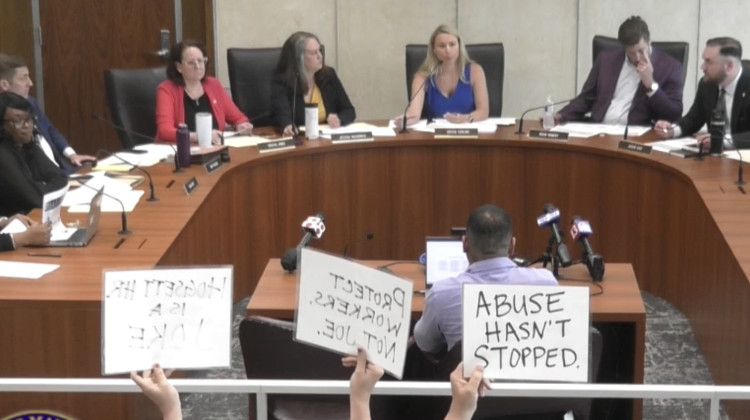
Lt. Governor Micah Beckwith made comments defending the Three-Fifths Compromise, which counted each slave as three-fifths of a person.
FILE PHOTO: Justin Hicks / IPB NewsLocal groups want an apology after Lt. Governor Micah Beckwith made comments defending the Three-Fifths Compromise, which counted each slave as three-fifths of a person.
During debate on a bill limiting diversity, equity and inclusion initiatives in the state, Democrats likened it to the 1787 Constitutional Convention agreement.
In a video posted online on April 24, Beckwith called the compromise, which did not allow slave-holding states to count enslaved people as whole persons for purposes of representation in the U.S. Congress, a “great move” that helped to end slavery.
In 1787, slaves were not allowed to vote, but Southern legislators wanted to count them in order to get more representation in Congress. Northern states would not allow the South to count slaves as full persons, because they worried it would give the South outsized power.
Groups, including the Indiana Black Legislative Caucus and the Baptist Ministers’ Alliance, slammed Beckwith’s statements.
The Baptist Ministers’ Alliance called it a “dishonor to the memory of those who were enslaved, disrespecting the struggle of generations who fought for civil rights.”
Reverend David Greene, president of the Concerned Clergy of Indianapolis, called on Gov. Mike Braun to denounce the statement.
“You need to apologize to the black community and all Hoosiers who value truth and equality,” he said. “To say that the three-fifths was a great move when it clearly was related to slavery, it's morally depraved.”
In a statement from Indianapolis faith leaders, including Greene, local leaders said the compromise “was about counting enslaved African bodies for political power while denying them humanity, freedom, and rights.”
WFYI reached out to both the governor and lieutenant governor for comments on this story. Neither responded.
But on Facebook, Beckwith responded to the backlash, saying, “I explained the REAL meaning behind the Three-Fifths Compromise — how our founders took bold steps to LIMIT the power of slave states and set the stage for slavery’s ultimate destruction. But the woke mob doesn’t want you to know that.”
The debate sprang up around Senate Enrolled Act 289, which bans public employers from requiring trainings that assert that a person’s characteristics “are inherently superior or inferior; that a person, by virtue of their characteristics, should be blamed for actions committed in the past; or that a person’s moral character is determined at all by their personal characteristics.” The bill also removes a requirement that public college boards have diversity committees. The bill has not been signed into law by the governor as of Tuesday.
In his video, Beckwith said that the compromise “was a great move by the North to make sure that slavery would be eradicated in our nation,” Beckwith said. “They [the founders] knew what they were doing.”
Beckwith’s arguments are part of a larger conversation about the legacy of slavery in the United States. But Historians say his arguments oversimplify the history.
In 2019, the New York Times Magazine published the 1619 Project, in which journalists, academics, and activists argued that slavery was central to the country’s founding.
The project quickly faced backlash, with the outgoing Trump Administration eventually forming the “1776 Commission” in an effort to respond to a “radicalized view of American history” that teaches students “to hate their own country, and to believe that the men and women who built it were not heroes, but rather villains.”
Statements that the Three-Fifths Compromise reveals the founders' intention to end slavery have been around for a long time, made by lawmakers like TennesseeState Rep. Justin Laffertyin 2021 and Conservative Commentator Glenn Beckin 2009.
Alex Lichtenstein, a history professor and chair of the Department of American Studies at Indiana University, said the view that the Three-Fifths Compromise was intended to end slavery obscures the country's relationship with slavery.
“To pretend that its abolition was written into the original 1787 document, because the founders were so wise and far-seeing, is just not accurate history, and therefore not helpful for Americans to know,” he said. “I think it's very clear that the original intent of the Three-Fifths Compromise was to win over the Southern states to the Union by assuring them that their peculiar institution, as they called it, was safe in the Union.”
But the Three-Fifths Compromise would be used as an argument against slavery decades later, with abolitionist Frederick Douglass using the compromise in the 1850s to argue that slaves could be viewed as persons.
“People like Frederick Douglass used the Three-Fifths Compromise strategically,” Lichtenstein said.
Douglass argued that the constitution recognized that enslaved people are persons as well as property, but, Lichtenstein added, there is no evidence that the founders foresaw this happening around 70 years later.
Other academics echoed Lichtenstein’s assessment, but acknowledged that history — and the constitution — are complicated.
Akhil Reed Amar, Sterling Professor of Law and Political Science at Yale University, also noted that the views of Douglass were nuanced and had changed over time, initially viewing the constitution as a pro-slavery document and ultimately interpreting it as anti-slavery.
“We have litigated the Three-Fifths Compromise at every moment in American history,” Amar said. “So there's nothing unique about today's moment. At our best, we are people who take seriously the Constitution and its history, so we have to have these conversations and debates.”
Contact WFYI reporter Benjamin Thorp at bthorp@wfyi.org.
 DONATE
DONATE






 Support WFYI. We can't do it without you.
Support WFYI. We can't do it without you.